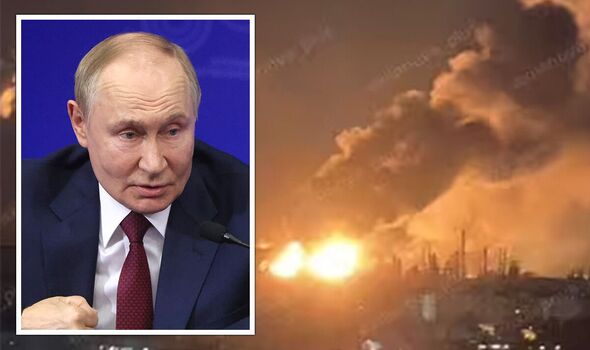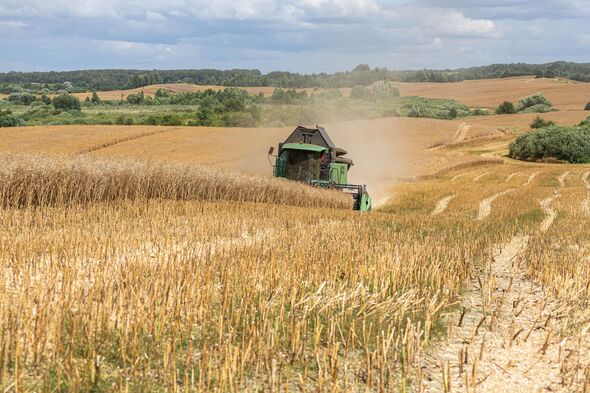
Vladimir Putin’s Russia is heading for a recession, with Ukraine targeting oil refineries (Image: GETTY)
Russia’s economy is edging toward a major crisis, according to economists and analysts, as war spending collides with falling energy revenues, a disastrous harvest, and Ukrainian strikes which are hitting the country’s fuel industry. Tatiana Orlova, lead economist for emerging markets at Oxford Economics, said in a note that “it’s too early to adopt a more optimistic view on the Russian economy, which we think is teetering on the brink of a recession.
“We also think there’s a significant probability of Russia’s economy slipping into a technical recession in the coming quarters.” Ms Orlova forecasted GDP growth will collapse from 4.3% in 2024 to just 1.2% this year, and stagnate below 1% in 2026 and 2027. Economy minister Maxim Reshetnikov has also admitted that Russia is “on the brink” of recession, while domestic banks have warned of a potential debt crisis as high interest rates weigh on borrowers.
Read more: Ukraine launches drone blitz on key Russian gas plant as fuel crisis explodes
Read more: Kremlin says Putin-Zelensky meeting won’t take place unless one condition is met

The Russian harvest is likely to be poor this year (Image: Getty)
The fiscal squeeze is tightening. Kremlin oil and gas revenue, its main source of war funding, fell by 27% in July compared with a year earlier to 787.3 billion rubles ($9.8 billion).
Moscow has been forced to draw heavily on its National Wealth Fund, which has dwindled from $135 billion in January 2022 to just $35 billion in May.
Peter Frankopan, associate fellow at the International Institute for Strategic Studies, wrote in a recent post that “Russia’s bad 2025 harvest is more than a weather event: it reveals the structural fragility of Russia’s war economy and the growing risks to a system built on fiscal buffers and fossil fuels.”
Russia is enduring its worst harvest in 17 years, with grain output expected to slump to 130 million metric tons, down 18% from its 2022 peak. Crops have been damaged first by spring frosts, then by record summer heat and drought.
Ukraine strike Russian trains carrying fuel and lubricants
Analysts warn that energy, long considered Russia’s strongest pillar, is also becoming a weakness.
A post from the Russian Telegram channel Nezygar, translated and shared by former Ukrainian interior ministry adviser Anton Geraschenko, said that “tensions in Russia‘s fuel market are rising: in Primorye, there are kilometre-long queues at gas stations, and wholesale prices for gasoline and diesel have hit record highs.
“Officially, the reasons are no longer hidden — refineries are shutting down after Ukrainian strikes. During peak summer days, up to 14% of processing capacity was idle.”
The same post said that in 2025 Ukraine had shifted its tactics from single strikes to repeated attacks on the same facilities, making repairs almost impossible.
I’ve decided to translate for you a post from the Russian Telegram channel “Nezygar” about the current state of Russian refineries and fuel market:
“Tensions in Russia’s fuel market are rising: in Primorye, there are kilometer-long queues at gas stations, and wholesale prices… pic.twitter.com/0cejOR5O4Q
— Anton Gerashchenko (@Gerashchenko_en) August 23, 2025
It said: “For example, after a series of attacks, Ryazan Refinery (5% of Russia‘s capacity) has half its processing halted, while Novokuibyshevsk Refinery (3%) has its primary processing damaged.
“The largest refinery in southern Russia, Volgograd’s Lukoil, as well as the Samara and Syzran refineries, have stopped receiving crude.”
The Nezygar account also pointed to a technological bottleneck, saying: “Modern Russian refineries were built using equipment from Shell, Axens, UOP, and Haldor Topsoe.
“After 2022, deliveries of equipment, software, and catalysts ceased. Catalysts are consumables, replaced every 1-3 years; without Western supplies, Russia relies on old stock or Chinese analogues with inferior performance.
“As a result, every Ukrainian strike on a hydrocracking or reforming unit leads to months of downtime.”
The post concluded that “Russia’s oil and gas industry, once a source of economic strength, has become a vulnerable spot.”
Anders Åslund, an economist and Russia expert, argued in a Project Syndicate article that “Russia’s economy is fast approaching a fiscal crunch that will encumber its war effort.
“Though that may not be enough to compel Putin to seek peace, it does suggest that the walls are closing in on him.”















